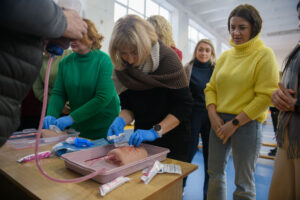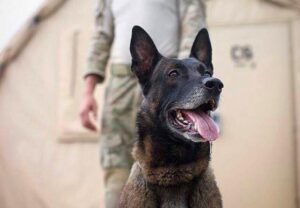Meet Eugenia Ihnateva, CEO of Antal Group Ukraine
When Russian missiles come for Ukraine, Eugenia Ihnateva has a mission: to protect her beloved homeland, no matter what. As the CEO of Antal Group Ukraine, her goal is to help civilians learn how to respond to disaster so that when the worst happens, they can confidently spring into action.
For Eugenia, working with Task Force Antal, the parent NGO to Antal Group Ukraine, is far more than a job. It’s a way of life and an act of service for the country she calls home.
“The most frightening thing for humans is the unknown,” she says. “What we don’t know frightens us.” Certainly, there are few dangers more frightening than a bomb headed directly toward the people and place you love most. One of the most important things you can give people, Eugenia says, is information. Being prepared saves lives.
Born in Lviv to a medical family, Eugenia grew up at a cultural crossroads. Lviv represents the Great North of an ancient trade route traveled by merchants and visitors from all over the world dating back to the 13th century. People came to sell their goods, and many stayed. The result is a vibrant cultural diaspora. In Lviv, you’ll find streets named for Serbia and Bulgaria, Armenian and Jewish communities, and traditional religion coexisting with a lively appreciation for Eastern European folklore—not to mention the largest number of architectural monuments in Ukraine.
To Eugenia, it’s Ukraine’s most beautiful city. “We citizens are proud of the fact that we are born here,” she says.
That pride is evident in the efforts Eugenia has taken to fight for her country’s safety.
After graduating from the local university with a degree in English literature, Eugenia began her career as an English teacher in Poland. But after a few years, she realized that she wanted to do more than teach the present simple. She moved back to her beloved hometown of Lviv and began gathering professional experience as an interpreter.
In 2014, following her son’s birth and Russia’s invasion of Crimea, Eugenia found herself on a bus with 35 other linguists from the length and breadth of Ukraine, headed to work on a military base. She remembers asking herself, “What are you doing?” But soon her purpose became clear.
For almost a decade, Eugenia provided strategic translation to diverse military branches and specialties, playing a crucial role in translating tactical military plans for the highest echelons of command at the United States Embassy in Kyiv. She also provided key linguistic support to the U.S. Forces training the Armed Forces of Ukraine.
“I always wanted to be an interpreter,” says Eugenia. It felt right to apply her skills in such a meaningful way, creating connections between people by honoring their words.
Naturally, when Russia invaded her home, Eugenia immediately took action. She already had experience in a post-invasion world; now, with the escalation and full-scale invasion of Ukraine, Eugenia became a leader.
Former Commanders of the U.S. training mission Dave Jordan and Tim Cleveland connected Eugenia with TFA. Christine was already aware of Eugenia and her abilities, and soon she joined the team, quickly becoming an invaluable member. She immediately began facilitating humanitarian trips and supply drops, ensuring that Task Force Antal could communicate with the people they were determined to help. She led TFA in navigating the intricacies of the conflict on-the-ground, bringing more capability and native know-how to the rescue work.
Soon, Task Force Antal developed front-line emergency medical (FLEM) training to teach civilians how to provide life-saving first aid when missiles strike. Eugenia helped organize the very first FLEM trainings. Today, she plays an invaluable role in helping FLEM reach the communities that need it most.
“It’s one thing to interpret,” says Eugenia, “and another to see the audience for who they really are and make the experience resonate with them.” TFA works with groups of all sorts, from young children to recently displaced people whose homes and livelihoods have been destroyed by Russian bombs.
Each population has a different need. It takes an expert to not only translate word-for-word but also to make sure that the message is heard and that people walk away feeling more confident, more safe, and more prepared than they felt before.
At Task Force Antal, Eugenia is that expert. She coordinates TFA’s efforts with local authorities and civilians, translating and writing constantly so that everything runs perfectly. Of course, she never forgets to water the flowers at the office, too.
Beyond her work at Task Force Antal, Eugenia enjoys postmodern literature, speaks four languages (five if you count German, which she is currently studying), and is the proud member of a classical Ukrainian dance troupe, which has withstood both Covid-19 and the outbreak of war. In fact, the troupe only paused for a week after the war began before reuniting online to keep practicing.
In Ukrainian character dance, as in language, you can put on many masks. That’s what Eugenia loves about both: the freedom to dance between cultures and time, and to furnish one’s own meaning.
It is this freedom which Eugenia demands for Ukraine. “I want to tell people that we are alive,” she says, “and that we deserve freedom. We deserve not to be killed.”
Every country lives with its own problems, says Eugenia, and consequently it is difficult for people outside Ukraine to fully comprehend what words cannot describe. “You do not understand until you find yourself in the trenches,” she continues.
“The words are just words until you find yourself here, waking up in the middle of the night, waking your child, leaving your warm bed and saying goodbye to your apartment, which you may never see again, to rush to the bomb shelter and listen to the sounds of UAVs approaching. We call them motorcycles, because they sound like motorcycle engines. Will they land outside the city or on your home? You can never tell.”
But Eugenia is far from hopeless. Citing Navalny and Churchill, her advice is clear: “Don’t give up. Never give up. Evil waits for us to become desperate, because when you are desperate, you are vulnerable.” Vulnerability is not a luxury that the current situation allows.
Eugenia’s message applies equally to the artistry of dance and the brutality of war. “You must keep trying,” she says. “No one is perfect. No one is born a dancer or a soldier. It’s about experience, about trying hundreds and hundreds of times. On the thousand and first try, you will be good. Maybe.”




